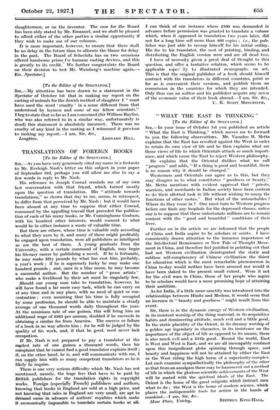"WHAT THE EAST IS THINKING"
[To the Editor of the SPECTATOR.]
SIR,—In your issue of October 1st you published an article "What the East is Thinking," which moves me to forward to you the following observations. Mr. Vasudeo B. Metta explains that the East has revolted against the West in order to retain its own view of life and he then explains what are those views of life to which Orientals attach so much import- ance, and which cause the East to reject Western philosophy.
He explains that the Oriental dislikes what we call "progress" and adds, "If a thing is good and beautiful, there is no reason why it should be changed."
Westerners and Orientals can agree as to this, but they may disagree as to what constitutes "goodness or beauty." Mr. Metta mentions with evident approval that "priests, warriors, and merchants in Indian society have been content to do their allotted task in life without wishing to usurp the functions of other castes." But what of the untouchables ? Where do they come in ? One must turn to Western progress before one finds any loophole for the depressed classes, unless one is to suppose that these unfortunate millions are to remain content with the "good and beautiful" conditions of their lives.
Further on in the article we are informed that the people of China and India aspire to be scholars or saints. I have consistently drawn attention to the immense importance of the Intellectual Renaissance or New Tide of Thought -Move- ment in China, and therefore feel justified in pointing out that had not Western civilization disintegrated the static and sublime self-complacency of Chinese civilization the thirst for education which is the most remarkable phenomenon in China to-day would neither have been aroused nor would it have been slaked to the present small extent. Were it not for the civil wars in China, those of her people who aspire to be scholars would have a more promising hope of attaining their ambition.
As for India, if a little more sanctity was introduced into the relationships between Hindu and Moslem, it would seem that an increase in "beauty and goodness" might result from this event.
Sir, there is in the dynamic energy of Western civilization, in its insistent worship of the thing material, in its acquisitive habits and domineering attitude, much evil and a little good. In the static placidity of the Orient, in its dreamy worship of a golden age legendary in character, in its insistence on the importance of the object of life as opposed to its means, there is also much evil and a little good. Round the world, East is West and West .is East, and we arc all inescapably confined upon this insignificant globe _spinning through space, and beauty and happiness will not be attained by either the East or the.West riding the high horse of a superiority-complex.
Let each examine sympathetically the philosophy of the other so that from an amalgam there may be hammered out a method of life in which the glorious scientific achievements of the West will be mated with the spiritual ideals of the East. The
Orient is the home of the great religions which instruct men what to do ; the West is the home of modern science, which places the indispensable tools for action in the hands of mankind.—! am, Sir, &c..
Moor Place, Yateley. -STEPHEN KING-HALL.


























































 Previous page
Previous page